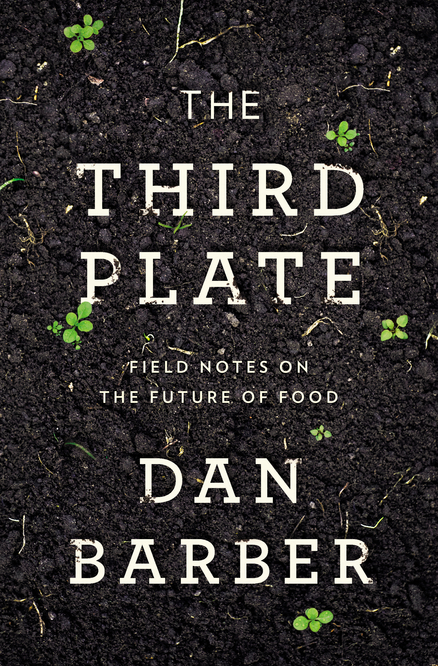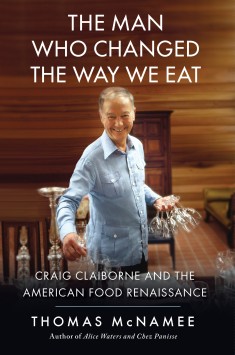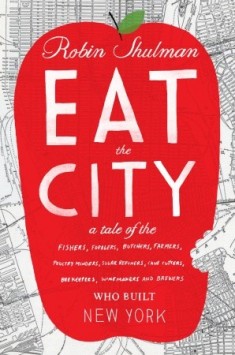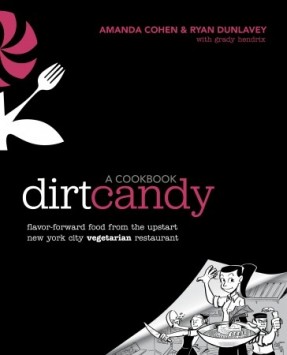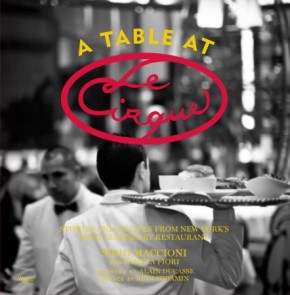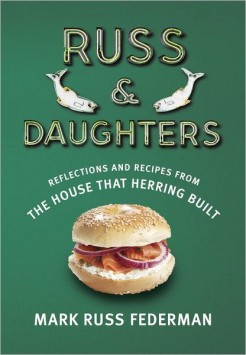The Third PlateField Notes on the Future of Food
An award-winning chef moves beyond ‘farm-to-table’ to offer a revolutionary new way of eating.
The Third Plate is chef Dan Barber’s extraordinary vision for a new future of American eating. After more than a decade spent investigating farming communities around the world in pursuit of singular flavor, Barber finally concluded that—for the sake of our food, our health, and the future of the land—America’s cuisine required a radical transformation.
The revelations Barber shares in The Third Plate took root in his restaurant’s kitchen. But his process of discovery took him far afield—to alternative systems of food production and cooking that maximize sustainability, nutrition, and flavor. Barber explores the traditional farming practices of the Spanish dehesa, a uniquely vibrant landscape that has been fine-tuned to produce the famed jamón ibérico. Along the Atlantic coast, he investigates the future of seafood through a revolutionary aquaculture operation and an ancient tuna fishing tradition. In upstate New York, Barber learns from a flourishing mixed-crop farm whose innovative organic practices have revived the land and resurrected an industry. And in Washington State he works with cuttingedge seedsmen developing new varieties of grain in collaboration with local bakers, millers, and malters. Drawing on the wisdom and experience of chefs and farmers from around the world, Barber proposes a new definition for ethical and delicious eating destined to refashion Americans’ deepest beliefs about food.
Traditionally, Americans have dined on the “first plate,” a classic meal centered on meat with few vegetables. Thanks to the burgeoning farm-to-table movement, many people have begun eating from the “second plate,” the new ideal of organic, grass-fed meats and local vegetables. But neither model, Barber shows, supports the long-term productivity of the land. Instead, he calls for a “third plate,” a new pattern of eating rooted in cooking with and celebrating the whole farm—an integrated system of vegetable, grain, and livestock production.
The Third Plate is truly a publishing event: a monumental work of personal insight and global analysis that definitively remakes the understanding of nutrition, agriculture, and taste for the twenty-first century. Barber charts a bright path forward for eaters and chefs alike, daring everyone to imagine a future for our national cuisine that is as sustainable as it is delicious.
Dan Barber
Dan Barber is one of the leading voices of America’s expanding farm to table dinning. Yet over the last few years he has begun to question the movement for which he had staunchly supported. The Third Plate is his attempt to answer some of his questions about what comes after the farm to table movement. Dan Barber recently spoke to Booksaboutfood.com about his new book.
Booksaboutfood.com (BAF): What does ‘The Third Plate’ refer to?
Dan Barber: The Third Plate is a metaphor for a way of eating. It’s not actually a plate of food. Although on my menu at both restaurants there are examples of a third plate. Really the book is about a call for a new pattern of eating or a new expectation for a plate of food. It’s not a book that I went about consciously writing. I really went about looking at some ingredients that were exciting to me and in other words, they were delicious, and I was trying to figure out how they were grown and raised and ultimately bring that recipe for how they were grown and raised back to the farm, the Delmar Center Farm, that farm’s just outside the restaurant at Blue Hill. The book just kept evolving into a different way to think about food. The way I was thinking about it was with single ingredient prescriptions and ideas about who was producing that ingredient and where it was coming from.
I am a card carrying member of the farm to table movement, but I became a little bit skeptical of one part of the farm to table event, and it’s the part that says that this type of eating is going to transform our food system or is going to be the way to opt out of an industrialized agri-business heavy food chain. What I came to understand through the research, and through the stories of some extraordinary farmers is that we were promising way too much. We needed to look at this in a little bit more of a holistic way. Holistic way I mean in a way that establishes new expectation of what’s for dinner. That can’t be what it’s been for the last 40 years or so and even beyond which is a protein centered plate of food, twice a day, 7 days a week.
The challenge is to figure out what is a delicious, nutritious, but also for me as a chef, what is a delicious expectation for dinner, and how do we go about assuring that we can produce that kind of food and that chef’s like me and eaters like you can enjoy that kind of food for the foreseeable future.
BAF: You said this is a book you didn’t start out to write but was there an aha moment when you came to realized there was something…
Dan Barber: Yeah. I had a couple of aha moments. Actually, the book’s divided in 4 sections. Within each section I had multiple epiphanies. It was interesting that the threading theme of the epiphanies were that they were agriculture epiphanies, but in as much as they were agricultural, they were gastronomic. I’ll give you a quick example. I was really excited about a variety of wheat that I was using in the restaurant that we were baking bread with, an amber wheat it’s an old biblical wheat, actually. It was grown by this guy Klaus Barns, this fantastic farmer in upstate New York. The wheat was just draw dropping delicious and stunning for our diners who ate bread. It’s whole wheat bread. The taste people were flipping out over it. I became quite well known for using this wheat, and when I went about researching for this book; How’s the wheat grown and what’s the deal with this guy Klaus? And how does he do it? I went to his farm, and I stood in the middle of his farm which is 2000 plus acres in the Finger Lakes region of New York of upstate New York. I looked around, and there wasn’t a lot of wheat growing. In fact, I didn’t see any wheat. What I saw was millet and buck wheat, and I saw lots of rye and barley. I saw leguminous crops like kidney beans and a lot of Austrian Winter peas, and I saw a lot of cover crops, clover and vetch and the rest.
What I started to, very quickly, because it was impossible not to see, was this idea that all of these crops were there for very particular reasons, and almost all of those reasons circled back to soil because Farmer Klaus was trying to increase and improve his soil fertility for the purpose of not just soil health but really of being able to grow a crop like the wheat that I use in my restaurant.
When I looked at it that way I could stand in the middle of 2000 acres and realize that the thing that you covet actually takes a fleet of other decisions and other manipulations to get you the kind of fertility you need. I all of a sudden started to see the fallacy, or the short coming, or the farm to table movement because it allows a chef like me, let’s say, to champion an ingredient like wheat or a tomato or an asparagus or whatever the seasonal farmer’s market item is and put it on our menu and wave the farm to table flag and claim that we’re supporting a local food system, which we are, but further claim that this is a better food movement, and the answer to the future of good eating when in fact what I was looking at in that 2000 acres were all crops that I didn’t support.
It’s not that I don’t like buckwheat or rye or millet. They’re great grains. In this farmer’s hands in particular, they’re extraordinary, but it was more that I didn’t covet them, and I didn’t support them. I thought, how ironic is this that I’m this well-known advocate for farm to table issues, but in fact, I’m not supporting the whole farm. I’m supporting what I want, and these other cops, soil building crops, leguminous crops, cover crops, all of these were going into animal feed essentially is where they ended up because there was no market for them. So Klaus was dumping these less coveted crops by you and me but very important soil building crops into bag feed. That mans we realize the potential of these grains through eating meat which is extremely inefficient. He also makes pennies on the dollar and actually loses money by growing these crops. Klaus was making a living and getting by fine because he’s selling me crops like wheat and charging a lot for it.
All of a sudden I started to see that farmers, when you start to learn the nuts and bolts of farming becomes quite clear that there’s a gastronomic responsibility to the agricultural realities. In this case, the agricultural reality is Klaus was forced into growing this myriad, really a laundry list, of different crops that builds soil fertility. I needed to figure out a cuisine, a pattern of eating, not a dish but a cuisine that supported what the soil was saying it needed to get that fertility not only for those coveted crops like wheat, Or we could be talking about corn. We could be talking about rice. We could be talking about a tomato because the betterment of a farming system, the soil health, the whole entire ecosystem is based on how the farmer negotiates an agricultural landscape.
We as eaters and advocates for this, even if it’s for flavor, you need to support a whole farm. The expression nose to tail eating for an animal; we need to adopt that nose to tail eating of the farm for the future. That’s where, I think, the third plate, the way to encapsulate that ideal.
BAF: You didn’t write this over a few months. It took 10 years.
Dan Barber: It’s a lot of research. I really changed as a chef and as a writer. Everyone changes over 10 years. But I was not on a planned trajectory here. I was really after something very simple, and I realized that in that search, very quickly, that I was asking the wrong questions.
BAF: With Stone Barns you were working so close to the land, but you still realized yourself that you were missing something.
Dan Barber: Exactly. I think you’re exactly right. There was something missing, or one could also argue that I was just greedy for the things that I was tasting and I wanted it for our own farming. Maybe it wasn’t that it was missing as much as that I saw new ideas that I wanted to adapt and what I kept learning that ecological systems are so varied and so much in flux that to demand or to go and seek out a recipe and apply it in another land is this crazy idea in retrospect. I didn’t know that 1 years ago, so I learned a lot along the way.
BAF: How has this all changed your cooking and when you’re behind the stove?
Dan Barber: In the way that I’m trying to adapt my cooking to support an entire landscape instead of supporting a particular farmer’s coveted crops. It’s a big difference, and to do that, that requires cooking, literally, the whole farm. One example, to dial in to what I was just talking about is I created a risotto out of that guy Klaus’s grains everything but wheat. It’s called rotation risotto. It’s a risotto of all these uncoveted, lowly grains and leguminous grass. It’s very important. We serve them as you would a risotto. First of all , it gets people asking what is meant by a rotation risotto, but it’s also quite delicious because his grains are so delicious. wrong. They’re extremely important to us. I don’t mean that because they’re so nutritious. I mean it because if we want to enjoy wheat, for one thing, we better learn to enjoy everything else.
That’s the beauty of cuisine. It forces you into a pattern of eating that supports the landscape. Any cuisine. That’s the history of cuisine actually when you look at it in the way that I looked at it anyway of how it evolved out of these negotiations that peasant farmers made to eek out whatever they could eek out from the land. Then they figured out a way to make the food nutritious and delicious. There were never coveted crops. You couldn’t create a pattern of eating around a few ingredients because the land doesn’t allow you. Any landscape does not allow you to grow the same thing over and over again or even a limited diversity of the same thing. While we may, we as Americans celebrate celebratory foods of different cultures, but in fact, when you look at Italian cuisine, we think tomatoes, mozzarella, whatever, but in fact, Italian cuisine is beans. That’s the cuisine. It’s bedrock is beans.
Why is it beans? It’s beans because nitrogen fixing. It created an environment in soil where they could grow everything else like tomatoes. Tomatoes are a very expensive soil fertility crop. They take a lot of real estate, and they suck nutrients out of the soil in ways that are like the hummer equivalent of the fruit and vegetable world. Yet, we as farm to table chefs, we exalt those vegetables and fruits and for good reason, but we can’t do it at the expense of everything else that supports the wheat or the tomatoes or whatever the coveted crop is which is why Italian cuisine is based on beans and why when parmesan cheese was invented, the whey that was taken off from the cheese making process, that wasn’t thrown away. It was fed to pigs. You got that pig the whey, and you get prosciutto be parma.
You can look at those kinds of examples repeated over every cuisine, every gourmet cuisine you can think of and every cultural cuisine that we think of in the history of the world. I kept coming back to cuisine and why I really ended up … this goes back to your first question, “Why name the book The Third Plate,” because we need a cuisine. We don’t need a philosophy about who to buy our food from although it’s important to recognize that local purchasing is important and organic is important all these labels are important, but superseding that is a label that puts it all together. By putting it all together, really need a fabric of patterns of eating that allow the landscape to thrive. That’s true sustainability. That’s why great cuisines have lasted.
BAF: It’s interesting how it seems to be all sort of a natural progression up to this point from the farm to table movement, then the organic is, I guess, a pattern as you mentioned…patterns in the fabric
Dan Barber: Yeah. We unfortunately don’t have a cultural context. We’re not tethered to any kind of cuisine in our history that we can fall back on. What all the great chefs of the world today are doing, the really great ones, are tethering their cooking to historic cuisines, historic ideas about food and modernizing them. Unfortunately in America, we don’t have a cuisine. I’m in California. Is California cuisine a cuisine? I don’t think so. California cuisine is really about a couple of great products. There are great products in California, but that’s not a cuisine. That’s not a pattern of eating.
The only real pattern of eating I could find in my research is Southern cooking. There you have something that put it all together. The Creole kitchens, the Carolina rice kitchen. These evolved out of the 1820s soil crisis when farmers recognized that soils were failing. Most of the farmers, dropped their plows, moved out West and plowed up the prairie. We know the disaster that happened a hundred years later in the 1930s with the dust bowl. That dried out the West because the soils failed. The ones who were left behind, unfortunately, largely slaves and plantation owners had to figure out how to you eek out a harvest and we entered into an age of really culinary exploration and experimentation, and it led to those ideas that were brought over in large parts from South Africa, from slaves, where you had to plant things like leguminous crops before you got your rice, the Carolina rice kitchen which is why Hoppin’ John the famous Southern dish lasts to today because it’s beans and rice.
You couldn’t have your rice without eating your beans, so you created a famous dish out of it that encouraged the eating of both. You had collards in there because collards de-salinated the soil. You could, able to grow things in a salty environment, and you have a smattering of pork because pork is so delicious and fatty, but the pigs were raised on the lush forest land which was free, was essentially free pigs. You didn’t have a big piece of protein for a pig. You had a smattering of pork that infused flavor into that iconic dish. That’s a dish that represents a cuisine that supports the landscape.
BAF: It’s intriguing how everything works together to create this cuisine. There’s something that we’ve lost touch of not being with our hands in the soil as we used to be.
Dan Barber: Exactly. My point is that I realized only through the research of this book is that we were never forced into that except then which I think is a really striking moment in our history that led to the land grant university system. It led to President Lincoln and these fantastic letters that he wrote. I couldn’t believe he really anticipated the idea that our country was going to fail if we didn’t develop a land grant university system that supported local agriculture and actually research, people who knew what they were doing because what became apparent from the 1820s is that we didn’t know what we were doing. We were largely a country that was founded on bad farming. People that came over here didn’t have land. They didn’t know how to farm. They got lucky because they had the east coast of the United States which from a geological phenomenon had this rick soil. It had rainfall, and we had plenty of good harvest without any kind of thought behind it. That’s been the history of our eating is abundance. That is not because we were such great farmers although there’s obviously some history of some real technologically advanced farming and because of the land grant university system, we are the envy of the world, but a lot of it has been dependent on an incredible and, as I say, an anomaly of fertility that is quickly running short.
BAF: What’s next on the horizon for you?
Dan Barber: Next of the horizon is really the challenge of circling back, and I have to honest. I’ve had to be honest, I’m just in the middle of the book tour, now, but I’ve already been asked give me an example of the Third Plate, and give me an example on your menu. Unfortunately, I have a lot of work to do on my own cooking, my own menu because if you came to my restaurant tonight for dinner, you’d still find a lot of protein centric plates of food. I’m running a business and that is what people expect. I’m slowly changing and reversing things. I’m serving now parsnips steak on the menu where the parsnips is the steak, and we roast it and cut it like a filet mignon or we serve it with bone marrow and a rich bordelaise sauce. We actually make a marmalade of a beef shank. It’s a very rich marmalade. It’s paired beautifully with red wine.
It’s a really neat experience but it turns the T-bone on its head. I need to do more of that if I’m going to walk the talk of The Third Plate instead of arguing for something and then in my own restaurant not following up on it. What’s next for me is to continue to be in the kitchen and think about putting these pieces together.
Booksaboutfood.com © 2014
“Dan Barber’s new book, The Third Plate, is an eloquent and thoughtful look at the current state of our nation’s food system and how it must evolve. Barber’s wide range of experiences, both in and out of the kitchen, provide him with a rare perspective on this pressing issue. A must read.”
–Vice President Al Gore
“In this compelling read Dan Barber asks questions that nobody else has raised about what it means to be a chef, the nature of taste, and what ‘sustainable’ really means. He challenges everything you think you know about food; it will change the way you eat. If I could give every cook just one book, this would be the one.”
–Ruth Reichl, author of Garlic and Sapphires and Tender at the Bone
“Dan Barber is not only a great chef, he’s also a fine writer. His vision of a new food system—based on diversity, complexity, and a reverence for nature—isn’t utopian. It’s essential.”
–Eric Schlosser, author of Fast Food Nation and Command and Control
“I thought it would be impossible for Dan Barber to be as interesting on the page as he is on the plate. I was wrong.”
–Malcolm Gladwell, author of David and Goliath and The Tipping Point
“The Third Plate is one of those rare books that’s at once deft and searching—deeply serious and equally entertaining. Dan Barber will change the way you look at food.”
–Elizabeth Kolbert, author of The Sixth Extinction and Field Notes from a Catastrophe
“After my first meal at Blue Hill, I paid Dan the ultimate farmer compliment. I told him that he made vegetables taste almost fresher after he had prepared them than when the farmer harvested them. Now I am equally impressed with his writing. Food has stories and Dan tells the stories as well as he cooks. If you want to know about food, read this book.”
–Eliot Coleman, author of The New Organic Grower and The Four Season Farm Gardener’s Cookbook
“After my first meal at Blue Hill, I paid Dan the ultimate farmer compliment. I told him that he made vegetables taste almost fresher after he had prepared them than when the farmer harvested them. Now I am equally impressed with his writing. Food has stories and Dan tells the stories as well as he cooks. If you want to know about food, read this book.”
–Eliot Coleman, author of The New Organic Grower and The Four Season Farm Gardener’s Cookbook
“Dan Barber writes with the restrained lushness with which he cooks. In elegant prose, he argues persuasively that eating is our most profound engagement with the non-human world. How we eat makes us who we are and makes the environment what it is. It all needs to change, and Barber has written a provocative manifesto that balances brave originality and meticulous research. His food is farm-to-table; his eloquent, impassioned book is farm-to-heart.”
–Andrew Solomon, author of Far from the Tree and The Noonday Demon
“Dan Baber is as fine a thinker and writer as he is a chef—which is saying a great deal. This book uses its ingredients—the insights of some of the finest farmers on the planet—to fashion something entirely new: a recipe for the future.”
–Bill McKibben, author of Wandering Home
“Barber’s work is a deeply thoughtful and–offering a ‘menu for 2050’–even visionary work for a sustainable food chain.”
—Publishers Weekly


